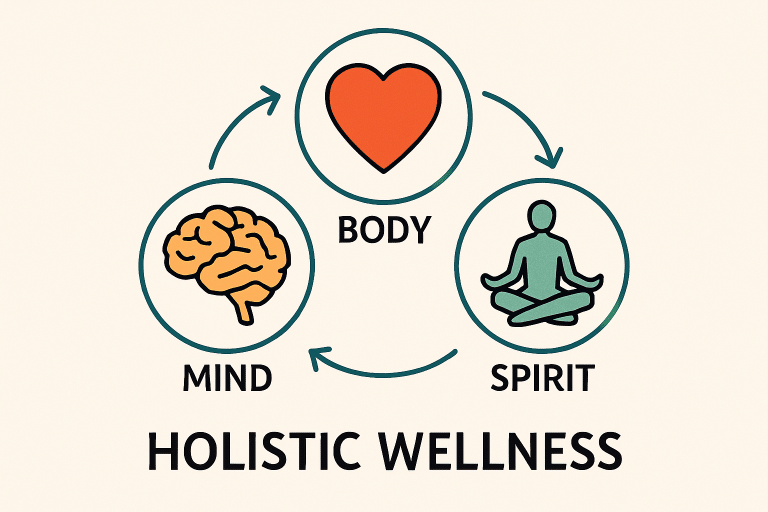In today’s increasingly hectic and fast-paced world, many individuals find themselves battling persistent stress, anxiety, and emotional difficulties that can detract from overall well-being. While conventional solutions often target symptoms in isolation, a holistic approach seeks to understand and address the complex interactions between mind, body, and spirit. This comprehensive perspective on mental wellness acknowledges that our emotional health is not separate from our physical vitality or our sense of meaning and connection. For those who wish to explore a more integrated and sustainable path to mental health, resources like https://newharborbh.com/ offer accessible guidance across a broad spectrum of holistic strategies. By adopting the holistic model, individuals open themselves to a wealth of diverse therapies, habits, and supportive networks that can cultivate long-term balance and resilience in every area of life.
Contents
Understanding Holistic Mental Wellness
The holistic approach to mental health goes far beyond simply offering temporary relief from negative emotions. It recognizes that psychological well-being is constructed from a network of interrelated factors, including our physical health, emotional awareness, social environment, and spiritual outlook. Rather than attempting to compartmentalize or ignore the influences of body, heart, and community, this method values their integration and acknowledges how one area can profoundly impact another. For example, chronic illness or pain can affect mood and relationships, while loneliness can undermine motivation to care for physical needs. By considering the whole person, holistic wellness enables us to uncover root causes of distress, cultivate strengths, and create meaningful, sustainable change that supports happiness and purpose across the lifespan.
Mindfulness and Meditation
Mindfulness and meditation are respected, evidence-based techniques known for supporting emotional stability and mental clarity. Mindfulness is the practice of purposely bringing one’s attention to present-moment experiences—thoughts, emotions, or physical sensations—without judgment or avoidance. Over time, regular mindfulness leads to increased self-awareness, emotional regulation, and a greater sense of calm, even when facing life’s inevitable ups and downs. According to the American Psychological Association, mindful practices regularly reduce symptoms of anxiety and depression and have even been linked to improvements in memory and flexible thinking. Meditation, a formalized mindful exercise, further strengthens attention, promotes relaxation, and encourages healthier, more resilient responses to everyday stressors. Options range from guided imagery and mantra meditation to quiet, solitary reflection, so individuals can find a style that resonates best with them.
Nutrition and Mental Health
Modern research has increasingly highlighted the significant connections between what we eat and how we feel. The emerging field of nutritional psychiatry explores how diet influences brain chemistry, mood regulation, and the risk for mental health disorders. Diets rich in whole, unprocessed foods—such as fruits, vegetables, whole grains, nuts, seeds, and healthy fats—provide essential nutrients (like B-vitamins, omega-3 fatty acids, and antioxidants) that protect brain cells and promote balanced neurotransmitters. For instance, omega-3 fatty acids, abundant in fatty fish, walnuts, and flaxseeds, are associated with boosted cognitive function and reduced symptoms of depression, according to Harvard Health. Conversely, diets high in processed products, refined sugars, and unhealthy fats are linked to mood swings, inflammation, and increased risk of anxiety. Small dietary changes, like increasing fiber and water intake, can help stabilize both mood and energy throughout the day.
Physical Activity and Exercise
Exercise is not only a cornerstone of physical health but also an indispensable factor in emotional and psychological well-being. Physical activity, whether vigorous and structured or gentle and mindful, increases the release of endorphins—neurochemicals that foster happiness, reduce pain, and lift overall mood. The Centers for Disease Control and Prevention (CDC) indicates that both aerobic and strength-based activities help reduce anxiety and depressive symptoms, enhance memory, and encourage restorative sleep. Even light forms of movement, like stretching, walking outdoors, or dancing to music, can interrupt negative thought cycles, sharpen focus, and provide a natural energy boost. Experimenting with different types and intensities of exercise helps individuals find approaches that not only enrich wellbeing but are also enjoyable and sustainable for a lifetime.
Alternative Therapies
Holistic mental wellness often includes complementary therapies that go beyond traditional talk therapy and medication. Practices like yoga, acupuncture, and breathwork are gaining widespread acceptance for their ability to bridge body-mind connections. Yoga unites physical postures, controlled breathing, and meditation, offering benefits ranging from increased flexibility to deep relaxation. Regular practice can ease anxiety, promote steady energy, and improve concentration. Acupuncture, an ancient technique that uses fine needles to stimulate specific points on the body, may support emotional balance and reduce headaches, insomnia, or symptoms of chronic stress. Breathwork, through controlled or conscious breathing, can instantly modulate the nervous system, lower heart rate, and create a rapid sense of calm during overwhelming situations.
Personalized Care
Just as every person’s life experiences, personality, and needs are unique, effective mental health care must be flexible and adaptive. The personalized care approach encourages individuals to collaborate with mental health professionals in developing wellness plans tailored specifically to their preferences, challenges, and cultures. This may involve a combination of counseling methods, strategies for stress management, medication support if appropriate, and routines for self-care at home. Personalization acknowledges that there is no single right way to heal—instead, it values creative combinations, iterative experimentation, and ongoing feedback. When care is individualized, engagement increases and positive changes become more sustainable over time, ultimately empowering each person to own their mental wellness journey.

Technology Integration
Technology is reshaping almost every aspect of mental health support, breaking down barriers and creating new opportunities for proactive self-care. There are now countless mobile apps designed to teach mindfulness, record daily moods, guide sleep, and provide instant access to evidence-based cognitive behavioral therapy tools. Teletherapy, which allows people to meet with counselors remotely, can serve those who lack access to in-person support or feel more comfortable connecting from home. Additionally, wearable tech provides valuable feedback on stress, heart rate, and sleep patterns, allowing users to make informed adjustments to routines and lifestyle. More cutting-edge advances, like virtual reality-based therapy, are being investigated for their capacity to provide safe spaces for relaxation or gradual desensitization, according to the American Psychiatric Association. These digital resources complement traditional care, offering versatile tools for self-reflection, daily accountability, and connection.
Community and Social Connections
Human beings are wired for connection, and meaningful relationships are among the strongest predictors of happiness and resilience. Engaging with supportive communities—whether through clubs, group exercise, creative workshops, spiritual organizations, or online forums—provides a vital sense of belonging that can buffer the effects of isolation and stress. Even brief positive interactions, like chatting with a neighbor or volunteering, can boost mood and foster a greater sense of purpose. Building and maintaining social networks encourages accountability and breaks the cycle of loneliness, reinforcing that none of us are truly alone with our struggles. Nurturing healthy relationships is therefore an essential component of holistic wellness, strengthening emotional resources and supporting long-term recovery.
To embrace a holistic model of mental wellness is to honor and care for oneself at every level: mind, body, spirit, and relationships. By implementing evidence-based strategies and drawing from both traditional wisdom and modern innovation, individuals can foster a sense of balance, purpose, and resilience that endures through life’s many changes and challenges.

